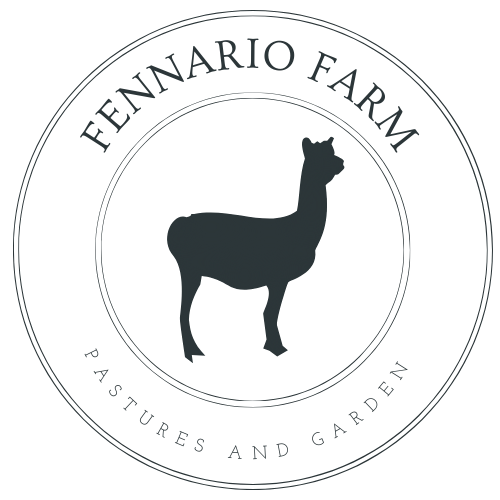The inspiration behind starting an alpaca farm, garden, and chicken pasture at Fennario Farm can be traced back to a family road trip that Bob's family took to Idaho when he was just 15 years old. This was the first time that he met these wonderful creatures and fell in love with them. The moment that Lara met an alpaca in person, she was delighted as well. It has always been important to us to live a conscious lifestyle and we wanted to create a space where we could grow our own food, raise animals in a natural and ethical way, and connect with the land. After 10 years of marriage, the day came when we decided: Let's just go for it. We risked a lot but feel that it is worth it to build the life that we want.
We have only grown in admiration for these gentle creatures. Alpacas are not only adorable but also have many practical uses such as providing soft and luxurious fleece for fiber arts. We were drawn to their calm temperament and low impact on the land compared to other livestock. By raising alpacas, we are able to contribute to the sustainable fiber industry while also enjoying their company. Since introducing our guardian llama, Hail, into our herd, we have grown to love the llama and their gentle majesty as well. As we grow, we plan to breed alpacas and also llamas.

Our love for gardening also played a significant role in starting Fennario Farm. We believe that growing your own food is not only healthier but also more environmentally friendly. Alpaca manure is perfect, sustainable fertilizer and we can incorporate it into our garden to boost our harvests. By having our own garden, we can ensure that our food is grown organically without any pesticides or herbicides.
Incorporating chickens into our farm was another decision based on sustainability and ethical considerations. Chickens not only provide us with fresh eggs daily but also help maintain a healthy ecosystem by eating insects, weeds, and kitchen scraps. They also play an important role in fertilizing the soil through their droppings.
One of the main reasons why regenerative and organic farming methods are important is because they prioritize soil health. Soil is far from being just dirt – it is a complex ecosystem that supports plant growth by providing nutrients, water retention capabilities, and habitat for beneficial microorganisms. Conventional farming practices such as monocropping (growing only one type of crop) can deplete soil fertility over time due to intensive tillage and heavy chemical inputs. This can lead to erosion, loss of biodiversity, and decreased productivity in the long run. By contrast, regenerative farming practices focus on building up soil health by using techniques like cover cropping (planting different crops to increase fertility and sustain moisture), crop rotation, minimal tillage, and in our case, incorporating local source manure and compost.
We hope that you will enjoy following along on our journey as we grow and learn. We have successes and failures ahead but we have had the opportunity to absorb so much from the experience of many kind folks in the field and we are evolving all the time. We are in awe every day over the work and love it takes to make this a reality. All of your support is deeply appreciated.

